Leaning in, sharing expertise, and learning from others is how physiotherapists (PTs) across UHN get the job done.
"What sets PTs at UHN apart is their drive to find new and innovative ways to be creative with their treatments, and work collaboratively with leading medical professionals across all of our disciplines, to turn patient's goals into reality," says Trish Stapleford, Discipline Head, Physiotherapy and Kinesiology.
From assessing a patient's level of physical functioning, to using movement and exercise to build strength and conditioning, PTs help patients safely transition back to their community following an injury or illness, and participate in the activities that matter most.
Here, PTs from across UHN open up about what makes their role unique, their secrets to success, and how they know they've made a difference.
Aislinn Braun, PT, Ajmera Transplant Centre, Lung Transplant Program
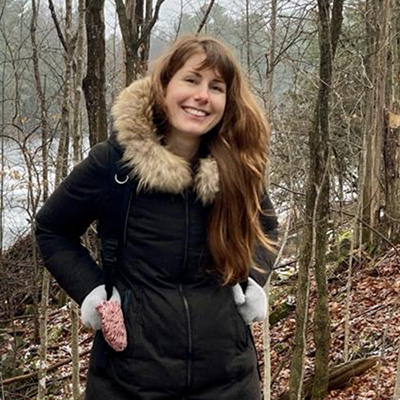
People are always surprised to learn that I...help patients waiting to receive a lung transplant to exercise on treadmills and lift weights. Patients often come in thinking, "I need to rest until I get my lung transplant, and then I'll feel better." But having strong muscles and a healthy body is protective when you're going through a major surgery, and you can exercise safely even with complex pulmonary conditions, and high oxygen needs.
My motivational superpower is...helping people feel empowered to exercise, even when they're not feeling their best. I use techniques such as motivational interviewing, active listening, graded exercise prescription, meaningful goal setting, encouragement, and education on exercise. If the benefits of exercise could be bottled and sold as a pill, than it would be one of the most prescribed drugs in the world.
A lesson I could have only learned on the job is..."People don't always remember what you say, or even what you do, but they always remember how you make them feel." (Maya Angelou). Sometimes the energy you bring makes as much of a difference as the education you provide.
I know I've made a difference when...a patient can stand up and walk shortly after their lung transplant.
To me, being a member of TeamUHN means...being privileged to participate in a culture that strives for excellence in evidence-based best practice, and active inclusivity.
Sierra Zabel, PT, Toronto Rehab
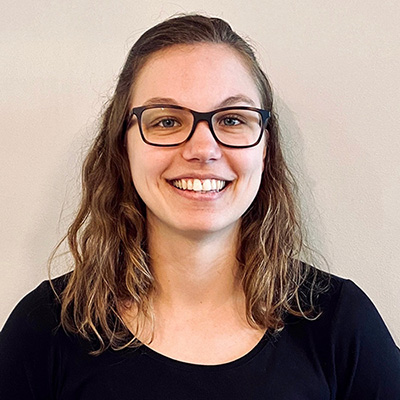
People are always surprised to learn that I...work with such a huge breadth of populations in the Low Tolerance-Long Duration Rehab Program. Most rehab programs specialize in a specific population, but at Toronto Rehab's Bickle Centre, we help any patient requiring an extended rehabilitation after amputation, spinal cord injury, stroke, neurological conditions, orthopedic injury, COVID-recovery, ICU-recovery and transplant.
My motivational superpower is...finding ways to incorporate humour, which keep sessions fun, despite the challenge. Humour fosters rapport, keeps patients engaged, and boosts everyone's mood. One time me and another therapist even performed a "dance-off" on either side of a patient's bed, to encourage them to roll from side to side.
A lesson I could have only learned on the job is...that my role as a therapist goes beyond physical rehab. Emotional well-being is an essential part of a person's recovery, and making time for a meaningful conversation can be as impactful as going for a walk.
I know I've made a difference when...a patient tells me, "I can't believe I can do this now." There is nothing more rewarding than seeing a huge smile on someone's face, after accomplishing a milestone in their mobility and independence.
To me, being a member of TeamUHN means...being part of a team that is passionate about providing the best quality of care to every person who walks through the door... and having fun along the way. Every healthcare provider values each others' contributions and perspectives in a truly collaborative environment. I am so proud to work among such kind, compassionate and supportive team members.
Brett Alexander, PT, Altum Health
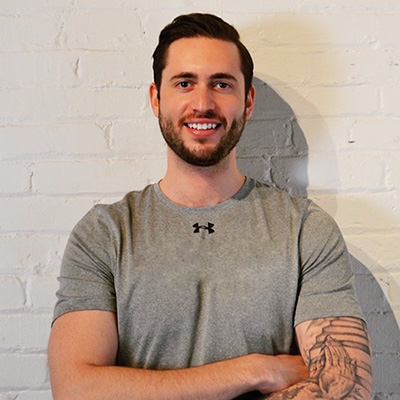
People are always surprised to learn that...Altum Health has launched a pop-up PT clinic at Princess Margaret Cancer Centre for TeamUHN, where profits go back into funding UHN infrastructure, research, and operations. I feel great gratitude that I get to be a part of fostering the growth of this clinic, as well as helping colleagues recover from injury and to make the most of their mobility, function, and well-being. Through a breadth of clinical experience and continuing education, I treat individuals with acute and chronic orthopedic conditions, post-surgical interventions, concussions and vestibular dysfunction.
My motivational superpower is...active listening and helping individuals create meaningful goals. I will be your biggest cheerleader on your rehab journey and will never stop trying to provide the best care possible.
A lesson I could have only learned on the job is...how unique each patient is. There are so many variables affecting how an individual experiences their injury and how these factors influence their recovery. When developing treatment plans, it is important to me to look at the entire person and not focus solely on their injury.
I know I've made a difference when...I see patients getting back to the activities they love doing. When I see them crushing their goals with a smile on their face, it reminds me why I love what I do.
To me, being a member of TeamUHN means...being part of an amazing work family. I feel blessed to be surrounded by so many smart, talented, empathetic, caring, and collaborative colleagues. I enjoy coming to Altum every day, and providing the best care.
Marcia Correale, Advanced Physiotherapy Practitioner, Schroeder Arthritis Institute
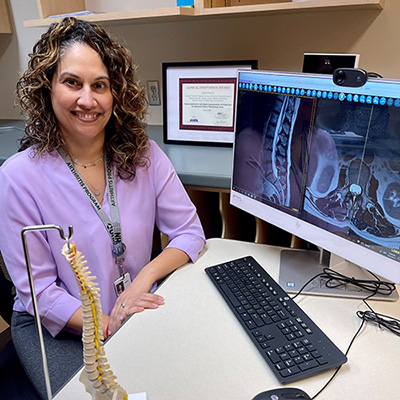
People are always surprised to learn that I...deliver evidence-based education to a network of more than 170 clinicians across Ontario to enable standardized assessments and comprehensive management of complex spine conditions. The advanced physiotherapy practitioner is an emerging role and the additional training, knowledge and skills I have gained has allowed me to effectively and appropriately manage complex spinal conditions, and translate these learnings to the provincial team.
My motivational superpower is...genuine empathy, a personalized approach to care and a positive attitude.
A lesson I could have only learned on the job is...that virtual care for spine assessment and management is not only possible, but it may also be the preferred method of care delivery for some patients. I'm proud of my contributions to the development of the Rapid Access Clinics for Low Back Pain Virtual Assessment and Education Toolkit, which is complete with patient and provider resources to ensure safe and effective standardized virtual care for the spine.
I know I've made a difference when...a patient says "thank-you, I appreciate the time you took to explain my condition and the management options available to me." While the majority of patients with low back pain get better with appropriate exercises and self-management strategies, there are some who seek further consultation. After a comprehensive assessment, I review their imaging, educate them on their condition, lessen their fears, and facilitate referral for surgery and/or injections, as needed.
To me, being a member of TeamUHN means...I get to work collaboratively with an innovative team that constantly seeks out best evidence-based care for patients. There is an emphasis on critical thinking, best-practice, creativity and a commitment to excellence that nurtures my inquiry mindset.
Jonathan Miranda, PT, General Internal Medicine
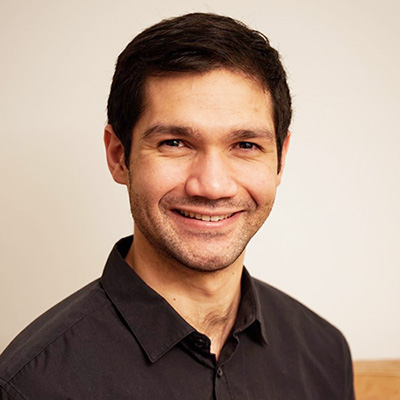
People are always surprised to learn that...the role of PTs in the acute care setting includes assisting with discharge planning. Along with occupational therapists and social workers, PTs also play an important role in assessing a patient's functional abilities and determining the necessary equipment, services and supports to safely transition out of the hospital environment. For example, a patient on General Internal Medicine may benefit from a walker to mobilize safely, or supports to reduce their risk of falling in the shower. This essential role helps to ensure patients are properly supported and to prevent re-admissions.
My motivational superpower is...helping patients appreciate the progress they've made in regaining their ability to perform day-to-day activities, regardless of how gradual it's going. Even recognizing minor improvements, such as being able to walk a short distance to use the washroom, can motivate patients to continue participating in therapy sessions.
A lesson I could have only learned on the job is...the nuances of navigating the healthcare system, and the pathways that exist. There are various locations patients can be discharged to, such as reactivation, transitional care, convalescence care, rehab, and home, and it takes time and experience to determine which will be most beneficial to our patients.
I know I've made a difference when...I've made patients feel comfortable enough to confide in me about their goals, questions and concerns, and have enacted their autonomy. I achieve this by actively listening to patients and asking meaningful questions to better understand patients as individuals. Being in the hospital can be challenging and intimidating for patients and developing this therapeutic relationship enables them to actively participant in their care.
To me, being a member of TeamUHN means...collaborating and learning from talented clinicians. In my three years at UHN, I continue to learn something new every day, and I know my team is here to support me.
